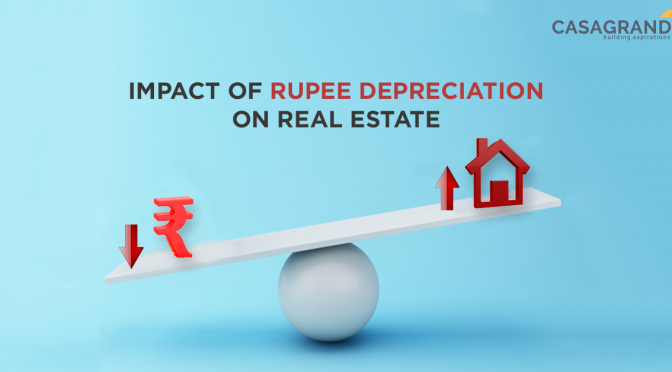Fluctuations in a currency’s value affect a country’s real estate in a number of ways – beginning with the cost of raw materials, labour and transportation to subcontracting builders, engineers and architects. But despite the Indian rupee hitting an all-time low of 74.04 against the dollar, Indian realty can still see a silver lining. A weaker rupee against the dollar makes investing in India cheaper for Non-Resident Indians (NRIs) and foreign investors. Here’s a quick look at how the falling rupee will affect different players in Indian real estate.
More savings for NRIs
With the dollar nearly touching Rs 75, the grass definitively looks greener on the Indian side for all foreign real estate investors. An apartment costing Rs 6.5 crores ($1 million) will now cost $878,000. The rupee’s depreciation has made luxury and high-end apartments even more affordable for the average NRI and is one of the main reasons you should buy a home in 2018.
However, while the current rupee value will make for substantial savings for NRI investors, it would be prudent on their part to wait for a little while in case the value of the rupee were to drop further. In addition, NRIs will also have to consider several logistical constraints including identifying the best property to suit their needs, negotiating a deal, completing all necessary formalities and filing documentation required to complete the transaction.
Early NRI investors can gain more
For first time homebuyers or those looking to enter or begin their investing journey in the Indian real estate market, the depreciation of the rupee will prove highly beneficial. Even more so if they have still not converted their foreign exchange into Indian rupees. There is a chance that the rupee value could fluctuate and fall further, but this is the right time to begin investing, as the exchange rate could go up in the future. Thus, the earlier you begin your investing journey, the more profitable your returns will be, particularly if you have not yet completed your transaction. While the dollar continues to remain strong against the rupee, Indian real estate will continue to see a subtle if not drastic growth in the years to come.
Impact on Indian buyers
NRIs and foreign investors are definitely the biggest beneficiaries from the slump of the Indian rupee. But all is not lost for Indian investors and homebuyers. In order to attract more buyers, property developers will begin offering their projects with several attractive offers such as easy payment schemes, pre-booking discounts or exclusive prices, free instalment of home appliances, etc.
Impact on the rental market
As the rupee continues to depreciate, it might cause a tight supply situation, with foreign investors and NRIs lapping up existing projects and buying stakes in new ones. Because of the increase in international attention and a leaner inventory, investors will be in an extremely advantageous position. The shortage of properties will give them the opportunity to hike up their rental income, as potential tenants will agree to pay a definite premium for a home of their choice and liking.
As a result, the rupee’s depreciation also proves to be an effective tool for taxpayers in India. For taxpayers in India who capitalise on residential rental properties, the devaluation of the Indian rupee is an effective tool. It helps you spread out the value of buying a home over decades, thus reducing your tax liability for every year.
New investors must exercise caution
While both Indian and foreign investors can benefit from the depreciating rupee, investors just entering the market will have to be cautious. There are high chances of properties being overvalued, and if they aren’t careful, they could suffer from wealth erosion if they buy the wrong property and the market does not remain the same way after the rupee normalises.
Be sure to take the following into consideration to avoid potential mistakes while investing:
- Invest in a property that has high rental prospects.
- Investing in a commercial estate over a residential one is a better choice during the slump for the rupee.
- Under-construction properties provide more uncertainty as construction costs can fluctuate with the rupee value. Opt instead for a ready-to-move-in home.
Overall, the rupee value against the dollar while low does provide plenty of opportunities to invest and grow your wealth. All you need to do is choose your properties wisely and invest with a long-term horizon to reap significant returns once the market stabilises.
Whether you’re an Indian homebuyer or a foreign investor, head over to Casagrand for superior homes to invest in. NRIs can also check out the ultimate NRI guide to buying property in India for comprehensive insights into the entire process.

















